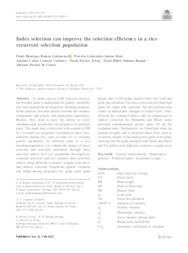Index selection can improve the selection efficiency in a rice recurrent selection population.
Index selection can improve the selection efficiency in a rice recurrent selection population.
Author(s): GUIMARÃES, P. H. R.; MELO, P. G. S.; CORDEIRO, A. C. C.; TORGA, P. P.; RANGEL, P. H. N.; CASTRO, A. P. de
Summary: To attain success with selection process, the breeders need to understand the genetic variability into each population developed by breeding program. In this purpose, breeders need to estimate the variance components and genetic and phenotypic parameters. Besides, they need to have the ability to select simultaneously genetically top progenies for multiple traits. This study used a field trial, with a panel of 198 S0:2 lowland rice progenies, evaluated in three environments during two years in order to: (i) estimate genetic parameters for different traits in a rice breeding population, (ii) evaluate the impact of direct selection and selection performed through three selection indices in a rice population developed by recurrent selection, and (iii) compare three selection indices using different economic weights with direct and indirect selection. Significant genetic variation was found among progenies for: grain yield, plant height, days to flowering, panicle blast, leaf scald and grain discoloration. The direct selection provided high gains for single trait selection, but this method may results in undesirable changes in related traits. Thus, between the evaluated indices and in comparison, to indirect selection the Mulamba and Mock index provided simultaneously greater gains for all the evaluated traits. Furthermore, we found that when the random weights and b-variation index were used as economic weight, it was found lower gains or no gains, showing that the gains attained with Smith and Hazel and Tai indices were linked to economic weights used.
Publication year: 2021
Types of publication: Journal article
Unit: Embrapa Roraima
Keywords: Genetic improvement, Predicted gains, Quantitative genetics
Observation
Some of Embrapa's publications are published as ePub files. To read them, use or download one of the following free software options to your computer or mobile device. Android: Google Play Books; IOS: iBooks; Windows and Linux: Calibre.
Access other publications
Access the Agricultural Research Database (BDPA) to consult Embrapa's full library collection and records.
Visit Embrapa Bookstore to purchase books and other publications sold by Embrapa.

